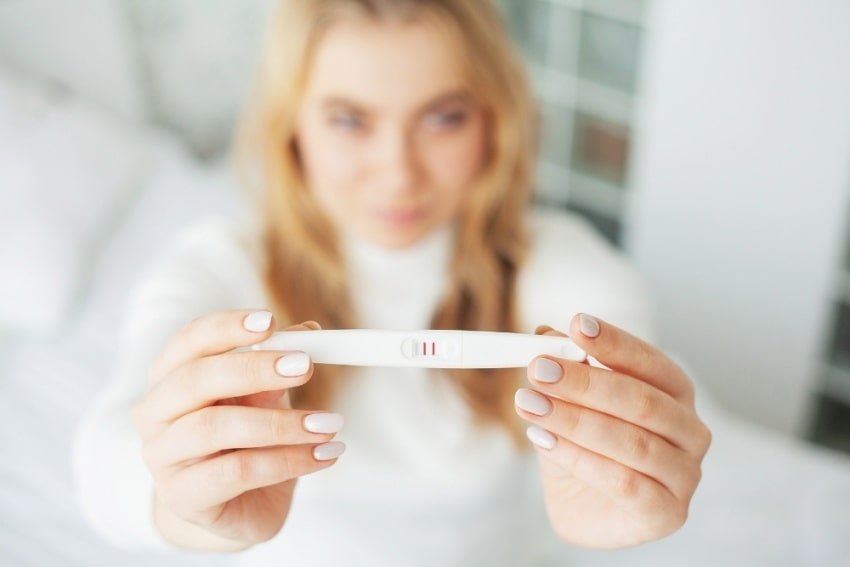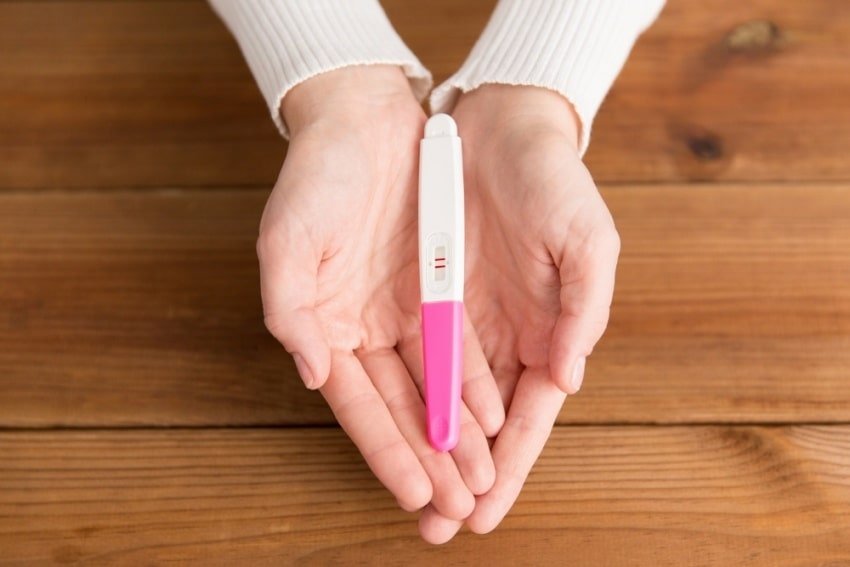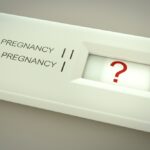The time period between the moment that you have unprotected sex until you find out if you’re pregnant can be agonizing. You spend every day checking your body for symptoms.
Then, you spend even longer trying to determine if they’re from pregnancy or PMS. It can feel like the longest two weeks of your life. This guide will help you determine if you’re pregnant, or not, making the 2ww a little less gruesome.
Don’t Do Things You Wouldn’t Do If You Were Pregnant
View in gallery
One of the most confusing things about this time period is not knowing what to do. Going drinking with friends can be a great stress reliever, but you don’t want to drink if you’re pregnant.
The same goes for anything else you wouldn’t normally do if you were pregnant, such as:
- Illegal drugs
- Drinking too much caffeine
- Heavy lifting
- Strenuous exercise
This can make the two-week wait seem longer, but it’s important to do this so that you don’t accidentally harm your baby.
Some 2WW Symptoms Are The Same As PMS
When you start to analyze every single symptom, look up two-week wait symptoms. Determine if you have them, you suddenly realize that some two-week wait symptoms are the same as PMS. For example, breast tenderness.
That’s why it’s important to see what symptoms of PMS are, the symptoms of being pregnant, and figure out which ones can give you a clue as to whether you are carrying a child.
Most Common Symptoms Of TWW:
- Cramping
- Breast tenderness
- Fatigue or being extremely tired
- Nausea
- Bloating
- Creamy, white cervical mucous
Most Common Symptoms Of PMS:
- Cramping
- Breast tenderness
- Fatigue
- Bloating
- Acne
- Joint and muscle pain
- Change in bowel movements (constipation or diarrhea)
As you can see most of the symptoms are the same. Sometimes, a change in bowel movement or being achy can also signal early pregnancy.
This can make those two weeks that much more confusing. However, there are certain things that can give you a clue.
TWW Symptoms By DPO (Days Past Ovulation)
One of the most common methods to help you identify whether you could, in fact, be experiencing pregnancy symptoms is to look at where you are in your ovulation cycle.
When you become pregnant, your body does certain things that might give you a clue as to whether you’ve finally got that BFP that you’ve been looking for.
[amalinkspro type=”showcase” asin=”B00AOJ5R8W” apilink=”https://www.amazon.com/dp/B00AOJ5R8W?tag=mominformedcom-20&linkCode=osi&th=1&psc=1″ new-window=”true” addtocart=”false” nofollow=”true” sc-id=”4″ imgs=”LargeImage” link-imgs=”false” specs=”We want you to be satisfied! Please call us with any questions or concerns at 1-800-321-3279. We are here to help~~~Easy to read, digital ‘smiley face results. Constant smiley for 2 days after peak fertility is identified~~~Typically identifies 4 or more fertile days to get pregnant(2) – at least 2 more days than any other test~~~Clearblue Advanced Digital Ovulation Test is the only test to accurately track 2 key fertility hormones” btn-color=”#ff9900″ btn-text=”Buy on Amazon” alignment=”aligncenter” hide-prime=”0″ hide-image=”0″ hide-price=”0″ hide-button=”0″ width=”750″]Clearblue Advanced Digital Ovulation Test[/amalinkspro]
What Is Ovulation?
Ovulation is what happens in order for your body to become pregnant. This is when an egg is released in hopes of turning into a beautiful baby.
Cervical mucous becomes thinner so it can help the sperm reach the egg. After the egg is released from the ovary, you can get pregnant. This is why most women try to tell if they are pregnant according to DPO.
When Is Ovulation?
Most women ovulate during the 11-21 days of the 28-day cycle. If you haven’t been keeping track of your cycle, that’s okay. The majority of women have a cycle that is 28 days long.
Your ovulation cycle starts on the first day of your last period and ends on the first day of your next period. So, think back to the first day of your last period.
If you have a regular period every month, you can assume that you have a 28-day cycle, but keep in mind you might be a few days off.
Your body should start to ovulate approximately 14-16 days after the first day of your last period. If you’re still confused, you can simplify things with this ovulation calculator. It does all the math for you!
Symptoms Of Ovulation/Pregnancy/PMS During TWW Based On Days Past Ovulation (DPO)
Here is where things get tricky. There are certain symptoms of ovulation that can easily be mistaken for early pregnancy symptoms.
It’s important to know what these symptoms are so you can determine if your body is having perfectly normal symptoms of ovulation.
DPO: 0-7 Days
During your first few days beyond ovulation, you won’t have any pregnancy symptoms.
View in gallery
Your body won’t display pregnancy symptoms until you’re pregnant, which is what happens when the egg is fertilized by the sperm and then attaches itself to the wall of the uterus. The egg must be fertilized first.
Then, it must attach itself to the inner lining of the uterus. Until this process is complete, the body will not realize that an egg is fertilized. This is why you won’t have any pregnancy symptoms during this period.
DPO: 6-8 Days
During this period, progesterone levels rise. It’s important to note that this happens regardless of whether you’re pregnant.
This hormone helps the body maintain the pregnancy, so it’s important that it be released before the egg implants itself on the wall to the uterus. It makes the walls of the uterus thicker so that the egg can successfully attach itself to them.
Progesterone also prevents the uterus from contracting and pushing the egg out. Unfortunately, it can cause several symptoms that can be mistaken for early pregnancy symptoms. These include:
- Drowsiness
- Breast tenderness
- Weight gain due to water retention
- Fatigue
- Mood swings
- Irritability
As you can see, some of the symptoms of early pregnancy are the same as the symptoms that progesterone can cause. Progesterone can easily make you think that you’re pregnant when you’re not.
If these are your only symptoms, try your best to make it through them. You might be pregnant, but you might not.
DPO: 7-10 Days
At this point, some women are finally going to get pregnant! During this brief period, the egg might attach itself to the uterus. This is commonly referred to as implantation because of the egg “implants” itself in the uterus.
The only symptom that women might have of implantation is a couple of days of light bleeding. Some women don’t experience that. Personally, I didn’t have light bleeding with either of my pregnancies.
Once implantation occurs, your body will start to produce what is called the pregnancy hormone, which is hCG. This hormone is responsible for most of the pregnancy symptoms that women experience, and it’s the one that pregnancy tests will test for.
In the beginning, the amount produced is so small that most women won’t get a BFP just yet, though. This is also why it takes a little more time for you to start showing pregnancy symptoms after implantation happens.
DPO: 11-14 Days
Now is the time that women will either begin to show symptoms of pregnancy or their bodies will begin to show symptoms that their period will start soon.
This can make it confusing as most women will show symptoms of one or the other, but the symptoms for both might be the same.
If the symptoms that you’re going to start your period soon are consistent every month, it might be easier to spot potential signs of pregnancy.
View in gallery
Signs that you might be pregnant include:
- Increased thirst
- Increased need to urinate
- Fatigue
- Cravings, such as suddenly loving marshmallows
- Nipples appear darker
Signs that you might be ready to start your period include:
- Cramping
- Fatigue
- Breast tenderness
- Mood swings
- Cravings
Some women will experience only one or two symptoms, and some women might not experience any at all. That’s what makes the TWW so frustrating! There’s no specific way to tell.
However, if you’re about to start your period, you might be far enough along to take a pregnancy test designed to detect pregnancy in the early stages. Some of these are very effective!
Watch For Inconsistency
One of the key ways to tell if you’re pregnant is by looking for inconsistency in your PMS symptoms.
For example, if you have had your period for years yet never experienced bloating or other symptoms that are suddenly taking over your life, it could be because you’re pregnant.
This is how I and my daughter knew we were pregnant before taking the test. When I was pregnant with my oldest, I was very tired.
I skipped school (I was 16) for a week because I could not seem to get enough sleep. Then, I started throwing up instead of getting my period. It was pretty obvious.
With my son, I had a feeling the moment the condom broke. I was very careful about the TWW. I did not have a single symptom, though. This was a bit odd because I always have PMS symptoms.
Instead, I was simply tired. There was no cramping, no food cravings, etc. The absence of symptoms was suspicious in that particular situation.
My daughter also did not experience her usually PMS symptoms. She had an upset stomach. Then, her period was late. For five years, she could track it like clockwork and always knew the exact day it would come.
When it was two days late, she knew. She’d never been late in her life before.
When Can You Take A Pregnancy Test?
One of the most reliable ways to determine if you’re pregnant is by taking a pregnancy test. A BFP is the one way that you can know if you’re pregnant.
Taking a pregnancy test one day after ovulation won’t help you, though. You have to wait until you are definitely pregnant and your body releases the hCG hormone so that it can be detected.
View in gallery
Early Detection Pregnancy Tests Can Detect Pregnancy 4-5 Days Before Your Missed Period
Pregnancy tests that are designed to test for pregnancy earlier than others can sometimes give you a BFP before your missed period. Most of these tests are surprisingly accurate.
[amalinkspro type=”showcase” asin=”B000052XHI” apilink=”https://www.amazon.com/dp/B000052XHI?tag=mominformedcom-20&linkCode=osi&th=1&psc=1″ new-window=”true” addtocart=”false” nofollow=”true” sc-id=”4″ imgs=”LargeImage” link-imgs=”false” specs=”Our #1 best-selling pregnancy test [4]~~~The ONLY brand that can tell you 6 DAYS sooner than your missed period [1]~~~Over 99% accurate from the day of your expected period [2]~~~Detects all forms of the pregnancy hormone [5]~~~Read your result in just 3 minu” btn-color=”#ff9900″ btn-text=”Buy on Amazon” alignment=”aligncenter” hide-prime=”0″ hide-image=”0″ hide-price=”0″ hide-button=”0″ width=”750″]First Response Early Result Pregnancy Test, (Pack of 3 tests) (Packaging & Test Design May Vary)[/amalinkspro]
Early detection pregnancy tests don’t always show you an early BFP, though. If a test is positive, you can usually trust that you have a BFP. However, if a test is negative you might need to take another one in a few days or a week.
Other OTC Tests Usually Work On The First Day Of Your Missed Period
Most OTC pregnancy tests can tell you if you’re pregnant on the first day of your missed period. Read the packaging to double-check, though. If you get a negative on the first day of your missed period, take another in a few days to be sure.
[amalinkspro type=”showcase” asin=”B07JG44SPR” apilink=”https://www.amazon.com/dp/B07JG44SPR?tag=mominformedcom-20&linkCode=osi&th=1&psc=1″ new-window=”true” addtocart=”false” nofollow=”true” sc-id=”4″ imgs=”LargeImage” link-imgs=”false” specs=”RELIABLE RESULTS – MomMed Pregnancy Test Strips provide a reliable test result with over 99% accuracy. The HCG urine test is precise and gives you the security you need.~~~FAST & EASY TO USE – With MomMed Home Pregnancy Test Kit, you can perform the pregnancy test on your own and without a specialists home.~~~FREE 20 URINE CUPS – In our package you get 20 free urine cups included. Other providers often do without urine cups. With our brand product you do everything right.~~~” btn-color=”#ff9900″ btn-text=”Buy on Amazon” alignment=”aligncenter” hide-prime=”0″ hide-image=”0″ hide-price=”0″ hide-button=”0″ width=”750″]Pregnancy Test Strips (HCG20) with 20 Free Urine Cups[/amalinkspro]
A Blood Test Is More Accurate Than A Urine Test
A blood test can also test for levels of hCG in your body. Often, these will pick up this hormone before a urine test does. A blood test can pick up levels of this hormone as early as 6-8 days after conception, making it the earliest way to tell.
However, you have to go to a doctor or hospital to have this test done. Then, you have to wait for the lab results.
An Ultrasound Can Tell You Immediately
This is why some women opt for the emergency room to determine if they’re pregnant. When an ultrasound technician does an ultrasound, they can see a tiny speck that will be your future baby.
However, most hospitals or doctors won’t order an ultrasound until you have missed your period, which almost makes it pointless as you can then take an OTC pregnancy test.
If you’re in the very early stages of pregnancy, however, the doctor might not be able to see the baby in the ultrasound yet. This is when they usually order a blood test to double-check.
False Negative Pregnancy Tests Are Common
False negatives are far more common than false positives in the world of pregnancy tests. These usually happen because your body does not have a high enough level of hCG hormones to give you a positive yet.
This can also happen because you are going to have a miscarriage. The body will detect a miscarriage before it actually happens, resulting in a decreasing level of hCG hormones.
A friend of mine was pregnant but didn’t know it. They took pregnancy tests, but they all came back negative. It turned out that they were pregnant, but they didn’t find out until they had a miscarriage.
In this situation, a blood test would have been helpful. This is always a great idea if you think you’re pregnant but have negative pregnancy tests.
View in gallery
False Positive Pregnancy Tests
False-positive pregnancy tests are rarer than false negatives, but they do happen. Certain things, such as medications, blood transfusions, renal failure, or taking hCG as a supplement, like to increase fertility, can all cause a false positive.
This is because all of these things can raise the hCG levels in your body, resulting in a false positive. If you’ve any conditions that could result in a false positive, ask for an ultrasound to confirm your BFP.
In Conclusion
TWW symptoms are different for everyone. Tracking symptoms can often tell you whether you are having symptoms of ovulation or not, but they might not be a definite indicator as to whether you are pregnant.
Instead, try to look for inconsistent symptoms if you can. Keep in mind the best way to verify pregnancy is by making it through that TWW and taking a pregnancy test.






